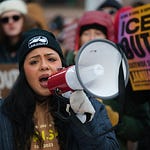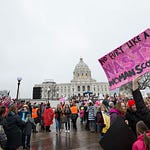Early Voting Sets New Mark
Early voting began Friday, September 19, 2025. On the first day of early voting, 351 ballots were cast at the Early Vote Center, and the city mailed 12,640 absentee ballots—a record number for a Minneapolis municipal election. For comparison, the first day in 2021 saw 3,736 ballots mailed.
If you’re not registered, you can register and vote early. If you don’t have proof of residence, a registered voter from your precinct may accompany you and “vouch” for your address. A registered voter may vouch for up to eight people.
Strong interest could be due to multiple factors: competitive local contests, clearer early-voting options, and sustained outreach by civic groups. The League of Women Voters Minneapolis continues to host nonpartisan candidate forums and publish guides that many voters use to learn about races.
Interview Summary
The conversation with Rebecca Thoman, President of the League of Women Voters Minneapolis, traces the organization’s roots to the post-19th Amendment era and its enduring mission: help voters—originally women, now all residents and especially underserved communities—understand issues, candidates, and how government works. Minneapolis is one of 34 local leagues within the Minnesota state league and the national LWV. Because city elections fall in odd years and attract less attention, the Minneapolis chapter concentrates on boosting awareness and turnout for these contests.
Thoman highlights stubbornly low municipal turnout—peaking at 52% during the last mayoral year and dropping to the 30s and even teens in some wards otherwise. She attributes this to noise in the media environment and confusion about who does what in government. The league’s voter education clarifies “where the levers are,” explaining, for example, that mental health funding is largely county-run and school funding is a state issue. The LWV remains strictly nonpartisan on candidates and parties while advocating on issues through positions long held by the organization (e.g., against gerrymandering), even as some topics have grown more polarized.
On forums, Thoman describes a structured, issues-first format rather than a debate. Moderators ask neutral, vetted questions—some prepared in advance and many drawn from the audience—and enforce decorum: no signage, no outbursts, equal time, and concise answers (typically 1–1.5 minutes). The league records and livestreams events and supplements them with a printed voter guide and Vote411.org, where voters can see sample ballots and candidate responses. For very large fields, such as the mayoral race, moderators rotate who answers first and may pair forums with meet-and-greets to create more one-on-one time.
The Minneapolis operation is run by two part-time staffers and a large, trained volunteer corps, which also conducts extensive high school registration efforts. Venue choices and outreach are made in collaboration with neighborhood councils, which help select accessible locations and anticipate logistical needs. On speech and conduct, Thoman says moderators intervene on name-calling or threats but otherwise allow controversial political views to be heard so voters can judge for themselves. Security is typically handled by host venues; the league alerts public safety officials and would call 911 if needed.
Finally, Thoman underscores practical voting details. Minnesotans can register online, on paper, or at the polls, but there’s a pre-registration cutoff before Election Day; after that date, voters should bring proof of residence (a utility bill often suffices if a license address is outdated). The league plans forums for all competitive city offices this cycle—mayor, every City Council ward with a challenger, Board of Estimate and Taxation, and all Park Board seats—plus partnerships for county races. Upcoming events and recordings are listed at lwvmpls.org and linked from Vote411. On Thursday, Oct 16, 6 - 7:30 pm, they will host a mayoral meet-and-greet planned at the Swedish Institute.










